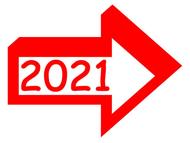2021 Climate Prospective
- By:
- Edward A. Reid Jr.
- Posted On:
- Jan 5, 2021 at 3:00 AM
- Category
- Climate Change
Dichotomy 1 : a division into two especially mutually exclusive or contradictory groups or entities
Future US climate policies currently face a clear dichotomy. The policies which will be pursued depend on the outcome of a still contested presidential election between two candidates with grossly different perspectives on the potential future impacts of climate change and the appropriate responses to climate change.
President Trump acknowledges that climate changes but has referred to the characterization of anthropogenic climate change as a “crisis”, or an “emergency”, or an “existential threat” as a “hoax”. He views the Paris Accords as unnecessary and as unfair to the United States and other developed nations. He withdrew the US from the Paris Accords and halted US funding of the UN Green Climate Fund.
President Trump’s EPA administrators ended the EPA practice of “sue and settle”, which was used to impose regulations which might otherwise have been unacceptable. The EPA administrators also began a review of the 2009 EPA Endangerment Finding regarding automotive CO2 emissions, which they believed was unsupported by the science.
These policies would be expected to continue in a second Trump Administration.
President Elect Biden and the Democrat Party have a very different perception regarding climate change and very different policy approaches to addressing the issue. President Elect Biden has described climate change as a “crisis”, an “emergency” and an “existential threat”. He has stated his intention to rejoin the Paris Accords “on day one” and to recommit to funding the UN Green Climate Fund.
He has committed his Administration to a $2 trillion plan to transition the US electricity grid to renewable generation by 2035 and to move the US energy economy to “net zero” CO2 emissions by 2050. This $2 trillion plan would provide financial incentives for a variety of programs, but would compel private investments and expenditures, through legislation and regulation, an order of magnitude greater. The Biden plan is very similar to elements of the Green New Deal and the Blue / Green New Deal, though the President Elect has not officially adopted either.
The President Elect has taken several inconsistent positions regarding oil and gas exploration on public lands and the use of hydraulic fracturing, at one time stating that he would ban hydraulic fracturing on both public and private lands. The position on oil and gas pipelines has been less clear, but new construction would not likely be encouraged and might be actively opposed. This would be consistent with the efforts of environmental activists and several Democrat controlled states to prevent pipeline construction; and, of several Democrat controlled cities to ban new natural gas services.
There are already indications that “sue and settle” would return to EPA and other federal agencies as an approach to rapidly deploying regulations which might face a long and tortuous path to implementation otherwise.
President Elect Biden has expressed a general willingness to use Executive Orders to reverse the Trump Executive Orders which reversed numerous Executive Orders issued by former President Obama. These Executive Orders could be expected to follow rapidly after his inauguration.
The potential futures for the US energy economy and the overall US economy are clear, but which future will eventuate remains uncertain.
"Democracy is the theory that the common people know what they want, and deserve to get it good and hard." -H. L. Mencken


